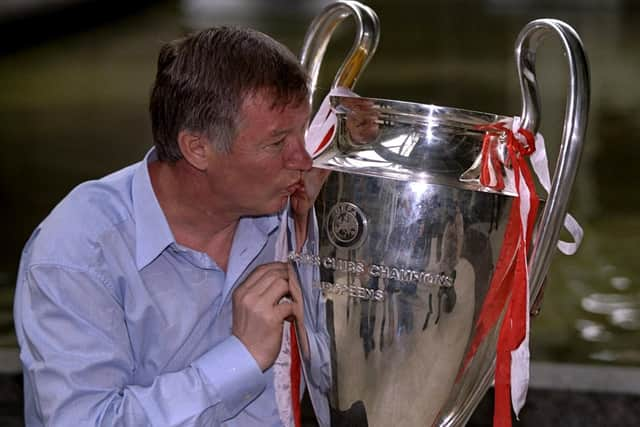European Super League’s an insult to the game’s glorious past argues JPImedia football writer Chris Boden
and live on Freeview channel 276
The Blackpool fan noted on Twitter: “A European super league made up of 3 countries and with 6 English clubs – some of which are not in the top 4 of premiership –and with no promotion or relegation is neither European, super or a league...”
Never mind the argument about capitalist greed, or the effect on the various pyramid systems dating back to the late 1800s, this power grab is pure arrogance.
Advertisement
Hide AdAdvertisement
Hide AdAs Gary Neville said on Sky, in a passionate outburst: “I’m disgusted with Manchester United and Liverpool most. Liverpool, ‘You’ll Never Walk Alone’, the ‘People’s Club’, Manchester United, a hundred years borne out of workers around here.


“And they’re breaking away into a league without competition? It’s an absolute disgrace.
“We have to wrestle back the power in this country from the clubs at the top of this league.”
Manchester United, Liverpool...fine.
United were pioneers of European football in the 1950s and 1960s, overcoming the horrors of Munich to lift the famous big-eared trophy at Wembley in 1968, and on two more occasions since.
Advertisement
Hide AdAdvertisement
Hide AdLiverpool likewise, built a dynasty in the late 1970s and into the 1980s, and have subsequently added titles in the modern era, to take their tally to a magnificent six.
Chelsea are London’s only European Cup winners, in 2012, and are again in the last four of this season’s competition.
But what right do the likes of Arsenal and Spurs have to be declared ‘elite?’.
Spurs were last champions of England in 1961, their second title success.
Advertisement
Hide AdAdvertisement
Hide AdTottenham haven’t won the FA Cup in 30 years, and their last trophy came in 2008. But they do have a superb, state of the art, brand-spanking new stadium.
Like Arsenal, they have never won the European Cup or Champions League –the North London rivals boast two losing final appearances between them.
The Gunners haven’t even been elite in the Premier League of late. Last season they finished eighth, and they are currently ninth.
What is so ‘super’ about that?
It smacks of the sort of self-obsessed thinking that gripped the late Bolton chairman Phil Gartside, who, in 2008, proposed a two-division Premier League with no relegation to the Football League, believing: “Local businessmen like [Bolton owner] Eddie Davies, the late Jack Walker [at Blackburn], Dave Whelan [Wigan] and Steve Gibson [Middlesbrough] have given their town teams unbelievable financial backing. They need to be protected in some way from the influx of outside investors with seemingly unlimited funds.”
Advertisement
Hide AdAdvertisement
Hide AdNo wonder Gartside wanted Bolton ring-fenced in the Premier League. Within four years they were relegated, and they are currently in the fourth tier for the first time since 1988, lucky to still be in business at all.
All these various owners and clubs would have done away with competition to protect their money, to deny Swindon, Bradford and Barnsley the dream of Premier League football.
Forty nine clubs have played in the Premier League since its inception, including less glamorous clubs such as Hull City, Huddersfield, Bournemouth, Reading and Brighton.
These Super League clubs would kill the dream of Dundee United, Apoel Nicosia, Leeds, Leicester, Schalke, Valencia and Monaco of again reaching the latter stages of the Champions League, or its forerunner.
Advertisement
Hide AdAdvertisement
Hide AdAnd, most arrogantly of all, prevent clubs like Celtic, Ajax, Feyenoord, PSV Eindhoven, Porto, Benfica, Nottingham Forest, Aston Villa, Hamburg, Steaua Bucharest, Red Star Belgrade (or Crvena Zvezda as they are now), Marseille and Borussia Dortmund from again competing to add to their European crowns.
How dare they?
The whole ethos of competition is that, no matter your club’s starting point, be it non league or Premier League, technically, you could work your way through the divisions, and enjoy a good enough season at the top level, to earn a European tour, again, like my club Burnley in 2018.
Burnley were the third English club to play in the European Cup in 1960, reaching the last eight, the width of a post away from a semi-final with Barcelona.
They then played in the Inter Cities Fairs Cup, the precursor to the UEFA Cup and Europa League, in 1967.
Advertisement
Hide AdAdvertisement
Hide AdClarets fans thought they would never see the day again, but half a century later, they returned to continental football.
Burnley’s dreams were short lived, losing out to Olympiakos in the play-off for the group stages of the Europa League, but it was emotional to watch the supporters pinching themselves, enjoying a drink in city centre squares in Aberdeen, Istanbul and Athens.
Ahead of the press conference at Pittodrie, I walked through the main entrance to see a replica of the European Cup Winners’ Cup, and Uli Stielike’s Real Madrid shirt from the 1983 final in Gothenburg.
Alex Ferguson’s side not only beat Real in the final, they knocked out Bayern Munich along the way – as Ferguson said, responding to news of a super league: “It was like climbing Mount Everest”.
Advertisement
Hide AdAdvertisement
Hide AdHe added: “Talk of a super league is a move away from 70 years of European club football.”
It is an insult to those legendary exploits of the past, and the prospect of those to come, to bolt the doors and allow the rich to just get richer and richer.
Thanks for reading. If you value what we do and are able to support us, a digital subscription is just £1 per month for the first two months. Try us today by clicking here